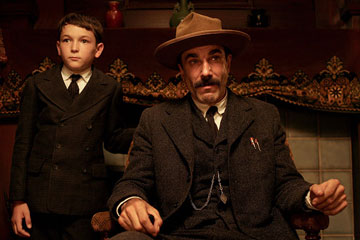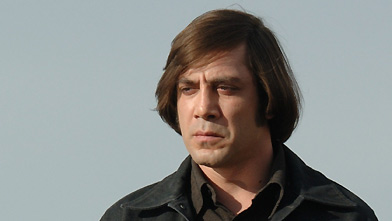I missed Monster’s Ball when it was on at the cinema, and I never really went out of my way to see it on TV. There’s no particular reason for this – except, perhaps, that there seemed to be more talk about the fairly explicit sex scene between Halle Berry and Billy Bob Thornton than about anything else. Okay, a good sex scene can make a film better (Don’t Look Now, I’m ogling you!), but there’d better be something beyond copulatory goodness.
Marc Forster, the director of Monster’s Ball, is one of the few Swiss people who’ve made it big in Hollywood – so big in fact that he’s now doing the new James Bond movie. He seems to be comfortable in many different genres and he gets in the good actors.

And yet. I wasn’t too keen on Stranger than Fiction, a film that desperately wanted to be more clever than it really was. True, Will Ferrell put in a fairly poignant performance, and I always enjoy watching Maggie Gyllenhaal, but all in all the movie felt like Charlie Kaufman Light, turning its metafictional veneer to the service of an essentially trite Carpe Diem story. And what was worse (at least for me): the book that the critically acclaimed author played by Emma Thompson was writing was drivel of the worst sort. It wasn’t even a parody of literary fiction – it was the sort of thing that a decidedly mediocre first-term creative writing student might cobble together, feeling awfully proud of himself.
Last week we watched Finding Neverland. Again, Forster’s assembled a lovely cast of actors: Johnny Depp, Kate Winslet, Julie Christie, Dustin Hoffman. The film is well crafted, obviously. But the story and dialogues render their work disappointingly toothless. Most of the performances are adequate, but let’s face it: it doesn’t take much to get an adequate performance from these actors. It’s more difficult to get a bad performance from them. But what can they do, when their characters can all be summarised in two sentences without being reductive?

There are small joys in both films. Dustin Hoffman is understated but great fun, both as the theatre impressario and as Stranger than Fiction’s literary critic. (I just wish he’d say what is so blatantly obvious – that the book Will Ferrell’s character is in is badly written rubbish.) And Freddy Highmore (who went on to play with Johnny Depp yet again in Charlie and the Chocolate Factory) is great. Not only is his acting subtle and moving, his character is probably the only one in the film who is ambivalent, who has depth, who doesn’t fit comfortably into a well-worn cliché.
Talking of children: perhaps the strangest, sweetest sight in any Deadwood episode is that of the school children lined up behind Joanie Stubbs and Calamity Jane holding hands, walking down the thoroughfare to their new school. For a few moments, the scheming and bloodshed comes to a complete halt as the inhabitants of Deadwood come out to watch the children. I have a feeling, though, that “Amateur Night” will be the last episode of the season (and, sadly, series) that will allow for such peace and quiet. Something is going to happen, and it’s going to happen sooner rather than later. I’ve rarely seen a series that managed as well to ratch up the tension. Somehow I have the distinct impression that the title of a recent P.T. Anderson film will describe the last three episodes of the series quite accurately.
And no, I don’t mean Punch Drunk Love.
 Prepare to have your milkshake drunk right across the internet: your cultural baristas once again return to the Paul Thomas Anderson well, this time to talk about his grim, disorienting epic There Will Be Blood that still confounds after multiple viewings. We also briefly touch upon family horror story Hereditary (which Mege talked about in this post), the surreal comic treat Legion (which we discussed in podcast #9) and and the celluloid nightmare that is The Lighthouse.
Prepare to have your milkshake drunk right across the internet: your cultural baristas once again return to the Paul Thomas Anderson well, this time to talk about his grim, disorienting epic There Will Be Blood that still confounds after multiple viewings. We also briefly touch upon family horror story Hereditary (which Mege talked about in this post), the surreal comic treat Legion (which we discussed in podcast #9) and and the celluloid nightmare that is The Lighthouse. Prepare to have your milkshake drunk right across the internet: your cultural baristas once again return to the Paul Thomas Anderson well, this time to talk about his grim, disorienting epic There Will Be Blood that still confounds after multiple viewings. We also briefly touch upon family horror story Hereditary (which Mege talked about in this post), the surreal comic treat Legion (which we discussed in podcast #9) and and the celluloid nightmare that is The Lighthouse.
Prepare to have your milkshake drunk right across the internet: your cultural baristas once again return to the Paul Thomas Anderson well, this time to talk about his grim, disorienting epic There Will Be Blood that still confounds after multiple viewings. We also briefly touch upon family horror story Hereditary (which Mege talked about in this post), the surreal comic treat Legion (which we discussed in podcast #9) and and the celluloid nightmare that is The Lighthouse.


